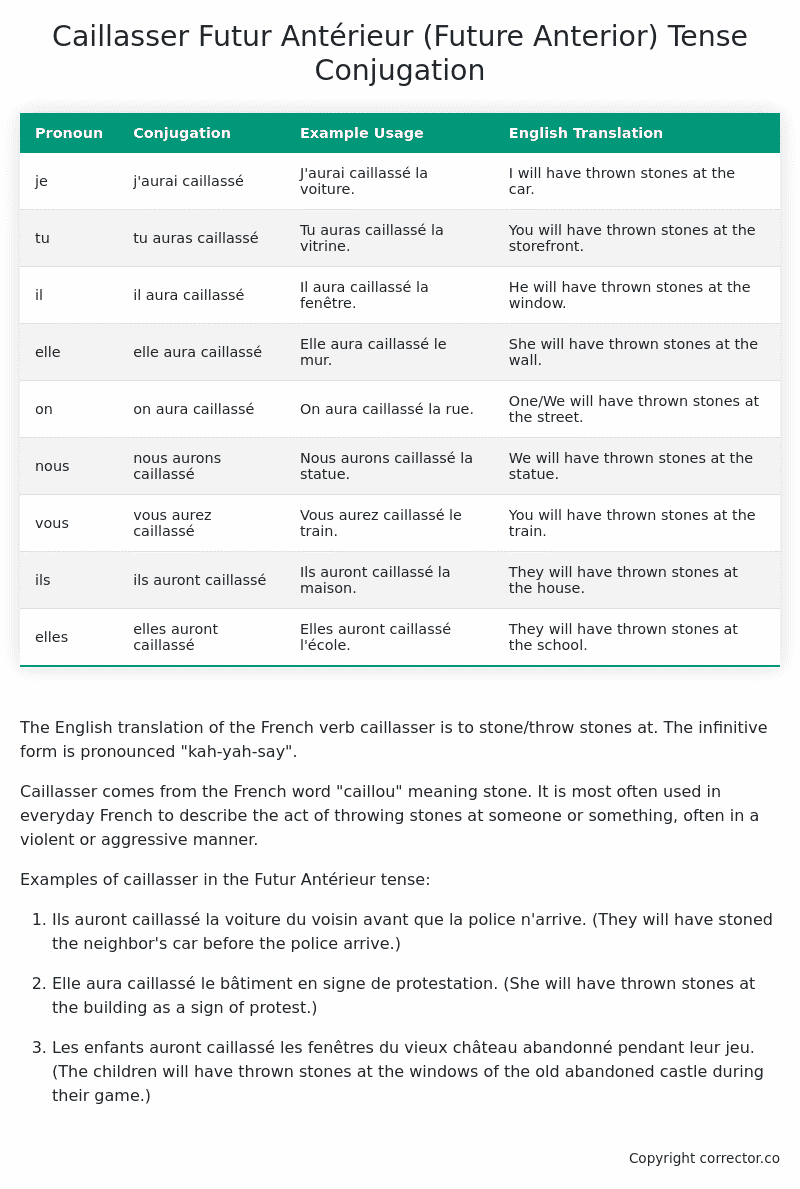Futur Antérieur (Future Anterior) Tense Conjugation of the French Verb caillasser
Introduction to the verb caillasser
The English translation of the French verb caillasser is to stone/throw stones at. The infinitive form is pronounced “kah-yah-say”.
Caillasser comes from the French word “caillou” meaning stone. It is most often used in everyday French to describe the act of throwing stones at someone or something, often in a violent or aggressive manner.
Examples of caillasser in the Futur Antérieur tense:
-
Ils auront caillassé la voiture du voisin avant que la police n’arrive. (They will have stoned the neighbor’s car before the police arrive.)
-
Elle aura caillassé le bâtiment en signe de protestation. (She will have thrown stones at the building as a sign of protest.)
-
Les enfants auront caillassé les fenêtres du vieux château abandonné pendant leur jeu. (The children will have thrown stones at the windows of the old abandoned castle during their game.)
Table of the Futur Antérieur (Future Anterior) Tense Conjugation of caillasser
| Pronoun | Conjugation | Example Usage | English Translation |
|---|---|---|---|
| je | j’aurai caillassé | J’aurai caillassé la voiture. | I will have thrown stones at the car. |
| tu | tu auras caillassé | Tu auras caillassé la vitrine. | You will have thrown stones at the storefront. |
| il | il aura caillassé | Il aura caillassé la fenêtre. | He will have thrown stones at the window. |
| elle | elle aura caillassé | Elle aura caillassé le mur. | She will have thrown stones at the wall. |
| on | on aura caillassé | On aura caillassé la rue. | One/We will have thrown stones at the street. |
| nous | nous aurons caillassé | Nous aurons caillassé la statue. | We will have thrown stones at the statue. |
| vous | vous aurez caillassé | Vous aurez caillassé le train. | You will have thrown stones at the train. |
| ils | ils auront caillassé | Ils auront caillassé la maison. | They will have thrown stones at the house. |
| elles | elles auront caillassé | Elles auront caillassé l’école. | They will have thrown stones at the school. |
Other Conjugations for Caillasser.
Le Present (Present Tense) Conjugation of the French Verb caillasser
Imparfait (Imperfect) Tense Conjugation of the French Verb caillasser
Passé Simple (Simple Past) Tense Conjugation of the French Verb caillasser
Passé Composé (Present Perfect) Tense Conjugation of the French Verb caillasser
Futur Simple (Simple Future) Tense Conjugation of the French Verb caillasser
Futur Proche (Near Future) Tense Conjugation of the French Verb caillasser
Plus-que-parfait (Pluperfect) Tense Conjugation of the French Verb caillasser
Passé Antérieur (Past Anterior) Tense Conjugation of the French Verb caillasser
Futur Antérieur (Future Anterior) Tense Conjugation of the French Verb caillasser (this article)
Subjonctif Présent (Subjunctive Present) Tense Conjugation of the French Verb caillasser
Subjonctif Passé (Subjunctive Past) Tense Conjugation of the French Verb caillasser
Subjonctif Imparfait (Subjunctive Imperfect) Tense Conjugation of the French Verb caillasser
Subjonctif Plus-que-parfait (Subjunctive Pluperfect) Tense Conjugation of the French Verb caillasser
Conditionnel Présent (Conditional Present) Tense Conjugation of the French Verb caillasser
Conditionnel Passé (Conditional Past) Tense Conjugation of the French Verb caillasser
L’impératif Présent (Imperative Present) Tense Conjugation of the French Verb caillasser
L’infinitif Présent (Infinitive Present) Tense Conjugation of the French Verb caillasser
Struggling with French verbs or the language in general? Why not use our free French Grammar Checker – no registration required!
Get a FREE Download Study Sheet of this Conjugation 🔥
Simply right click the image below, click “save image” and get your free reference for the caillasser Futur Antérieur tense conjugation!

Caillasser – About the French Futur Antérieur (Future Anterior) Tense
Construction
Common Everyday Usage Patterns
Interactions with Other Tenses
For example
Summary
I hope you enjoyed this article on the verb caillasser. Still in a learning mood? Check out another TOTALLY random French verb conjugation!


